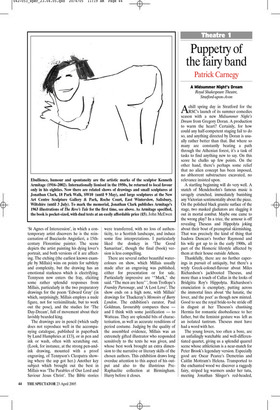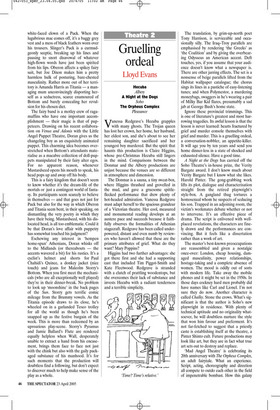Puppetry of the fairy band
Patrick Carnegy
A Midsummer Night’s Dream Royal Shakespeare Theatre, Stratford-upon-Avon Achill spring day in Stratford for the RSC’s launch of its summer comedies season with a new Midsummer Night’s Dream from Gregory Doran. A production to warm the heart? Certainly, for how could any half-competent staging fail to do so, and anything directed by Doran is usually rather better than that. But where so many are constantly beating a path through the Athenian forest, it’s a task of tasks to find anything new to say. On this score he chalks up few points. On the other hand, there’s perhaps some relief that no alien concept has been imposed, no abhorrent substructure excavated, no relevance insisted upon.
A startling beginning will do very well. A snatch of Mendelssohn’s famous music is savagely crunched, immediately banishing any Victorian sentimentality about the piece. On the polished black granite surface of the stage, two masked gladiators are slugging it out in mortal combat. Maybe one came to the wrong play? In a trice, the armour is off revealing Theseus and Hippolyta joking about their bout of prenuptial skirmishing. That was precisely the kind of thing that Isadora Duncan’s brother Raymond and his wife got up to in the early 1900s, all part of the Homeric lifestyle affected by them at their house outside Athens.
Thankfully, there are no further caperings in pursuit of antiquity, but there’s a wryly Greek-colonel-flavour about Miles Richardson’s jackbooted Theseus, and more than a touch of Callas in the looks of Bridgitta Roy’s Hippolyta. Richardson’s enunciation is exemplary, putting across the immortal lines about ‘the lunatic, the lover, and the poet’ as though new minted. Good to see the royal bride-to-be stride off in disgust at her Theseus’s chastising Hermia for romantic disobedience to her father, but the feminist gesture was left as an isolated tantrum. Theseus must have had a word with her.
The young lovers, too often a bore, are an unfailingly watchable and well-differentiated quartet, giving us a splendid quarrel scene whose athleticism is a near-match for Peter Brook’s legendary version. Especially good are Oscar Pearce’s Demetrius and Caitlin Mottram’s Helena. Transported to the enchanted wood we discover a raggedy fairy, striped leg warmers under her tutu, meeting Jonathan Slinger’s red-headed, white-faced clown of a Puck. When the lugubrious mac comes off, it’s a baggy grey vest and a mess of black feathers worn over his trousers. Slinger’s Puck is a curmudgeonly sceptic, breaking up his lines and pausing to snort disavowal of whatever high-flown words have just been spirited from his lips. Oberon affects a spikey fairy suit, but Joe Dixon makes him a pretty harmless hulk of posturing, bare-chested masculinity. Rather more out of her territory is Amanda Harris as Titania — a managing mum unconvincingly disporting herself as a seductress, scarce enamoured of Bottom and barely concealing her revulsion for his chosen diet.
The fairy band is a motley crew of ragamuffins who have one important accomplishment — their magic is that of puppeteers. Drawing on his recent collaboration on Venus and Adonis with the Little Angel Puppet Theatre, Doran gives us the changeling boy as an exquisitely animated puppet. This charming idea becomes overstretched when Bottom’s attendants materialise as a macabre collection of doll-puppets manipulated by their fairy alter egos. For no apparent reason, whenever Mustardseed opens his mouth to speak, his head pops up and away off his body.
This is a fairy kingdom that doesn’t seem to know whether it’s the dream-life of the mortals or just a contingent world of fantasy. Its participants seem scarcely to believe in themselves — and that goes not just for Puck but also for the way in which Oberon and Titania seem bent, in their speaking, on dismantling the very poetry in which they have their being. Mustardseed, with his dislocated head, is all too emblematic. Could it be that Doran’s love affair with puppetry has somewhat touched his judgment?
Eschewing any interest in ‘hempen home-spun’ Athenians, Doran whisks off to the Midlands (or thereabouts — the accents wavered a bit) for his rustics. It’s a cyclist’s helmet and shorts for Paul Chahidi’s Quince, a donkey jacket (nice touch) and jeans for Malcolm Storry’s Bottom. When you first meet the mechanicals (who are all exceptionally well played) they’re in their dinner-break. No problem to look up ‘moonshine’ in the back pages of the Sun. Storry gets terrific comic mileage from the Brummy vowels. As the Titania episode draws to its close, he’s wheeled on in a garlanded Tesco trolley for all the world as though he’s been snapped up as the festive bargain of the week. This is more than redeemed by an uproarious play-scene. Storry’s Pyramus and Jamie Ballard’s Flute are rendered equally helpless when Wall, desperately unable to extract a hand from his encasement, brings them face to face not just with the chink but also with the gaily packaged substance of his manhood. It’s for such moments that the production will doubtless find a following, but don’t expect to discover much to help make sense of the play as a whole.




















































 Previous page
Previous page